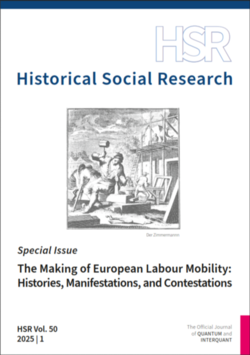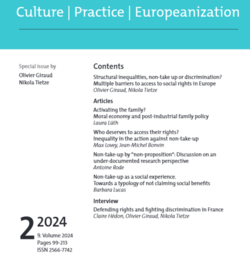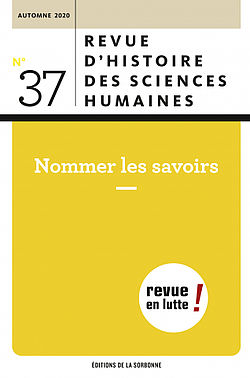PD Dr. Nikola Tietze | Researcher

Home Institution
:
Hamburger Stiftung zur Förderung von Wissenschaft und Kultur
|
Position
:
researcher
|
Disciplines
:
Sociology
|
Biography
Nikola Tietze is WiKu-Fellow at the Centre Marc Bloch and a research associate at Lise (Cnam, Paris). A researcher in sociology with a habilitation from the University of Hamburg, she worked from 2000 to 2015 at the Hamburger Institut für Sozialforschung. She joined the Centre Marc Bloch in September 2017 after holding various research responsibilities and collaborations.
Researchtopic
Nikola Tietze is mainly concerned with migrant workers and their families. Research on their ability to act in the face of social inequalities and systemic discrimination is the central theme of her sociological work, which combines approaches from historical studies and the sociology of law. In particular, she has worked on the construction of belonging through religion, territory and language and the ability to criticize social and political conditions in French and German immigration society (Hamburger Edition 2001 and 2012). She has also researched Europeanization, particularly through the introduction of post-sovereign territoriality (with Ulrike Jureit, Hamburger Edition 2015, Der Staat 2016, Internationale Kritik 2018).
Conflicts over social citizenship in the immigrant society. Access to social rights and equal treatment: the interplay of scales of public action
The Making of European Labour Mobility: Histories, Manifestations, and Contestations
May 16, 2025Nikola Tietze , Karim Fertikh
Historical Social Research
Collection: Historical Social Research
Culture, Practice & Europeanization -Special issue on barriers to access to social rights
November 01, 2024Olivier Lipari Giraud , Nikola Tietze
Edition: Special issue, volume 9
ISBN: 2566-7742
In the tradition of West-European welfare states, social policies are directed at protecting individuals against social risks such as unemployment, illness, or old age. In doing so, welfare state arrangements have an important effect on compensating for socio-economic inequalities, while simultaneously producing structural stratification (Esping-Andersen, 1998). The inequalities addressed by the welfare state are, however, always multidimensional. For instance, gender has for long been identified as a source of inequalities. Labour market regulations and social security systems have reinforced the male breadwinner model in most European countries (Lewis, 1992; Verloo, 2006), which has led to a higher degree of inequality between men and women. Welfare states may focus on one specific type of inequality, such as amongst socioeconomic groups (defined by professions, regions, income groups, etc.). The established welfare regimes ignore, however, other structures of inequality such as gender. Most of the time, they also overlook obstacles that can be traced back to specific vulnerabilities, such as migrants’ problem with residence permits or discrimination against people with disabilities, that eventually generate non-take-up of social benefits.
The present issue of Culture, Practice and Europeanization focusses on the barriers that socio-economic inequalities, non-take up, and discrimination constitute for access to social rights and benefits, centring attention on the process of making social policy and receiving social benefits in different national and welfare-state contexts. We aim to identify the elements and configurations that create and uphold these barriers as social policy is framed, implemented, and adopted by beneficiaries (Béland, Campbell & Weaver, 2022; Rein & Schön, 1996; Streeck & Thelen, 2005).
37 | 2020 Revue d'histoire des sciences humaines. "Nommer les savoirs"
September 30, 2020Guillaume Mouralis , Martin Herrnstadt , Léa Renard , Serge Reubi , Nikola Tietze
Revue d'histoire des sciences humaines
Edition: Éditions de la Sorbonne
Collection: Revue d'histoire des sciences humaines
ISBN: 979-10-351-0593-8
Les noms des savoirs sont souvent des boîtes noires que l’on manipule avec ingénuité. Pourtant, qu’ils forgent de nouveaux intitulés pour leurs pratiques savantes ou reprennent des dénominations existantes, les savants eux-mêmes y prêtent une grande attention. Étudier la façon dont on nomme et regroupe les savoirs permet de travailler sur leur émergence, les conditions de leur succès, leurs resémantisations invisibles ou les controverses qui les ont traversés. La dénomination et l’agrégation des savoirs sont indissociables de partitions, de découpages et de distinctions. À travers l’analyse des différentes épithètes feuilletant la « géographie » dans la France des xixe-xxe siècles, on met par exemple au jour une histoire beaucoup moins unitaire que ne le voudraient les représentations autochtones. Souvent transnationaux, les cas étudiés témoignent des appropriations variées d’un même terme comme « enquête », « ethnopsychiatrie » ou le diptyque philologie/linguistique. Enfin, en s’arrêtant sur « behavioral sciences », « moral sciences », « Geisteswissenschaften » ou « sciences humaines » c’est l’objet même de la Revue d’histoire des sciences humaines qui se trouve interrogé.
Ungleichheitskonflikte in Europa - Jenseits von Klasse und Nation
December 10, 2018Nikola Tietze , Monika Eigmüller
Europa - Politik - Gesellschaft
Edition: Springer
Collection: Europa - Politik - Gesellschaft
ISBN: 978-3-658-22245-1
Im Fokus des Bandes stehen die Beziehungen zwischen Ungleichheitskonflikten und Europäisierungsprozessen. Wie und wann tragen Ungleichheitskonflikte zum Wandel europäischer Ordnungen bei? Inwieweit werden sie durch europäische Rechtsetzung, Staatstätigkeit oder ökonomische Regelungen produziert? Die Autorinnen und Autoren untersuchen in ihren Beiträgen nicht nur die Transformationen nationaler Ungleichheitsstrukturen und die Entstehung neuer, spezifisch europäischer Ungleichheiten. Vor allem gehen sie auch den Veränderungen der Situationsdeutungen und Problemwahrnehmungen in Bezug auf soziale Ungleichheiten im Kontext der Europäisierung nach. Damit zielen die Beiträge sowohl auf eine konfliktphänomenologische Erweiterung der Europasoziologie als auch auf eine konflikttheoretische Ergänzung historisch-soziologischer Europaforschung.
Publications
(avec Olivier Giraud) "Le droit inné dans l'action publique en France et en Allemagne: la mise en oeuvre de dispositifs d'accès aux droits", Cahiers de philosopie de l'université de Caen 61/2024, 127-146, https://doi.org/10.4000/11vsi
Naming, blaming und claiming von Diskriminierungserfahrungen. Über die soziale und historische Verfasstheit von Affektsemantisierungen. In: Leviathan 51/4/2023, p. 526-551. DOI: 10.5771/0340-0425-2023-4-526
Berliner Unionsbürgerinnen in den jeux d’échelles der Europäischen Union. https://lesvoiesxdelacarte.eu/les-minima-sociaux-a-berlin-de/in Les voi.es.x de la carte. Tonkörper Berlin, kuratiert von Marion Picker und Julio Velascohttps://lesvoiesxdelacarte.eu/intro-de/ [en français: Des citoyennes européennes berlinoises dans les jeux d’échelles de l’Union européenne https://lesvoiesxdelacarte.eu/fr/les-minima-sociaux-a-berlin-fr/, in Les voi.es.x de la carte. Tonkörper Berlin, organisée par Marion Picker et Julio Velasco https://lesvoiesxdelacarte.eu/fr/intro-fr/ ]
Les échelles de l’Etat social, ou l’institutionnalisation de l’agencement des solidarités et du marché. In : Giraud, Olivier ; Perrier, Gwenaëlle (éd.) : Politiques sociales : l’état des savoirs. Paris : La Découvertes 2022, p. 285-302. (avec Olivier Giraud)
Space, Territories, and Borders in Europe. In: Büttner, Sebastian M.; Eigmüller, Monika; Worschech, Susann (éds.): Sociology of Europeanization. Oldenbourg: De Gruyter, 2022, pp. 51-73 (avec/mit Camille Noûs).
Genre, territoire et legal imagination : la mise en récit des droits sociaux et de la non-discrimination a la Cour de justice de l’Union européenne. In: Lechevalier, Arnaud ; Mercat-Bruns, Marie ; Ricciardi, Ferruccio (éds.) : Les catégories dans leur genre. Genèse, enjeux, productions. Buenos Aires : Teseo, 2022, pp. 403-442. URL:
https://www.teseopress.com/lescategoriesdansleurgenre
Alacevich, Michele : Albert O. Hirschman. An intellectual Biography. New York: Columbia University Press 2021, in: HSozKult, 21.12.2021, https://meinclio.clio-online.de/open/pdf/publicationreview/reb-96982/
Public Action Categories in the Maelstrom of Circulating Significations: Sociological Comparison and Its Critical Asset. In: Giraud, Olivier & Lallement, Michel (éd.): Decentering Comparative Analysis in a Globalizing World. Leiden/Boston: Brill, p. 387-410. DOI: https://doi.org/10.1163/9789004466609_017
Publications in PDF format



